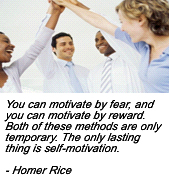Let’s Talk Motivation
 Motivate. Look the word up in a dictionary and you’ll find synonyms like: inspire, stimulate, encourage, persuade, evoke, arouse, and influence. You don’t find the word “threat” in that list. Nor do you see the word “fear”. Those two words are not there because the intent of motivation is to inspire action in a positive manner, getting stronger results. When is the last time you were strongly motivated by threat or fear, other than to get away from that situation? Those two words don’t conjure up an attitude of wanting to move toward, or closer to, what’s threatening or scaring you.
Motivate. Look the word up in a dictionary and you’ll find synonyms like: inspire, stimulate, encourage, persuade, evoke, arouse, and influence. You don’t find the word “threat” in that list. Nor do you see the word “fear”. Those two words are not there because the intent of motivation is to inspire action in a positive manner, getting stronger results. When is the last time you were strongly motivated by threat or fear, other than to get away from that situation? Those two words don’t conjure up an attitude of wanting to move toward, or closer to, what’s threatening or scaring you.
Real motivation, the kind that lasts and has a deep impact, is not about the carrot and stick approach. That motivation approach says “do well and get a reward; do poorly and get punished”. Real motivation comes from within, and is based on both internal and external influences. Read Daniel Pink’s book, Drive, about what drives us to perform at our best. Find out why it isn’t the carrot and the stick approach, even though it’s still one of the most used motivation tactics in businesses and in homes. Pink says that while making a fair salary and receiving job recognition are clearly important, the three most important components driving motivation in the 21st century are autonomy, mastery and purpose.
Think about it. When you do your work, you want clarity about the job expectations, access to helpful resources, feedback along the way, and you want some open space to get the job done. You want an environment that values ongoing learning and growth and challenges you to expand your expertise. You’re not afraid of hard work or lofty goals and it’s important for you to know that what you’re doing makes a difference – has a bigger purpose than just completing the task. You want to know that it brings significant value to others, making it worth your time and effort.
If that is what you want and what the research (and there is a great deal of it in Pink’s book) says others want, what are you doing to ensure that the culture in your workplace is a motivation builder rather than a motivation reducer? Seems to me that your Elephant and Rider, referred to in this month’s ezine article, are counting on you!
Vicky Dearing, PCC